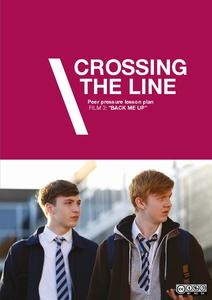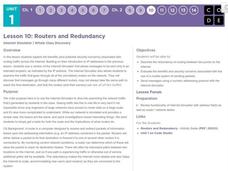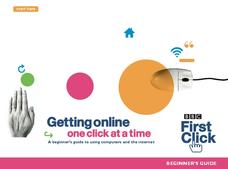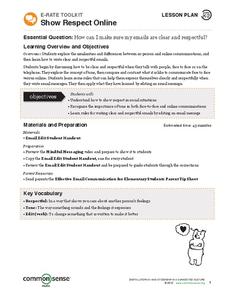Nemours KidsHealth
Cyberbullying: Grades 9-12
A bully, a victim, and a bystander—far from the beginning of a joke, cyberbullying is no laughing matter. Bystander or upstander? As part of the study of cyberbullying, high schoolers first read a series of articles about cyberbullying...
Nemours KidsHealth
Online Safety: Grades 9-12
Teach teens how to protect themselves from hackers, scammers, and online predators. First, class members examine their own digital footprints think critically about their online profile. Groups then generate lists of "do" and "don't do"...
Teaching Tolerance
How Online Communication Affects Privacy and Security
Digital footprints leave a lot of clues behind! Pupils discuss the positives and negatives of having a digital footprint and what it means. Then, using a handout, scholars learn ways to protect their online privacy.
Teaching Tolerance
Tweeting for Change
Do some good with social media. Secondary scholars participate in a live Twitter chat focusing on social justice issues. The thought-provoking activity allows academics to set up a live chat, create responses, and express their personal...
Purdue University
Email Etiquette for Students
What's the best way to discuss a problem or concern with a professor? Using a helpful PowerPoint, scholars learn how to use e-mail to communicate effectively with their instructors. They discover good and bad e-mail topics, appropriate...
NPR
Lesson Plan: Trolls—Just Like You and Me?
Not all trolls hide under bridges; some of them hide behind computer screens! Learners explore the causes and effects of people leaving mean comments online. After learning vocabulary, watching and discussing a video, and responding to...
British Council
Unit 1: Email addresses
E-mail is a communication sensation! Young job seekers discover the essential knowledge required to thrive in an online world in the first of a nine-part series of career education and skills lessons. The resource covers e-mail address...
Facebook
Passwords
Creating a strong password is easy ... but remembering it is a different story! Cyber scholars analyze the methods used by hackers to gain access to private information through a digital citizenship lesson. After learning more about...
Facebook
Healthy Relationships Online
Chatting, texting, commenting—there are so many options for online communication! How do teens know what's appropriate? Social scholars collaborate to define the elements of a healthy online relationship during an activity-packed digital...
Facebook
Online Presence
What happens when an online post gets the wrong kind of attention? Learners evaluate the good, the bad, and the occasionally ugly side of social media posting with a instructional activity from a vast digital citizenship series. After...
Me and My Shadow
Trace My Shadow
Which creates more digital traces: surfing the Internet in a coffee shop, or using an iPhone to send a text message? The answer may surprise you! An interactive resource prompts users to choose which devices, operating systems, and...
Childnet International
Self Esteem
To middle schoolers, there's nothing worse than being excluded from a peer group. Developing important self-esteem skills can not only get them through awkward adolescent times, it can carry them through the rest of their lives as...
Childnet International
Peer Pressure
What do you do if someone you like wants you to do something you don't want to do? A series of activities, including discussion, videos, role-play, and poster projects, demonstrate the most effective ways to withstand peer pressure online.
Fluence Learning
Writing an Argument: Is Electronic Communication Helpful or Harmful?
Technology has undoubtedly improved the lives of people around the world—but has it improved communication? Seventh graders read two informative passages about the rise of texting and emailing versus in-person conversations before...
Google
Online Safety Roadshow Activity
What does it mean to have digital citizenship? A set of lessons teach middle schoolers how to be safe and productive online. From sharing posts to creating secure passwords, learners discuss the importance of remaining diligent—and...
Family Online Safety Institute
Digital Citizenship Flashcard Deck
Being responsible online, leaving a digital footprint, and knowing how to be Internet safe are all important aspects of digital citizenship. Use a set of flash cards that promote conversations among the classroom and instill awareness of...
Code.org
Algorithms Detour - Shortest Path
Young programmers investigate the Single Source Shortest Path problem by working in paris to devise their own algorithm. They then progress to using Dijkstra's Algorithm to solve the problem.
Code.org
Routers and Redundancy
How are messages to the right recipient? Introduce the concept of routing Internet traffic by drawing a comparison to sending a letter. Groups use the Internet Simulator program to send messages to others using the same router and...
Code.org
Packets and Making a Reliable Internet
That's not what I said! My message did not arrive in the correct order! Introduce the concept of packets and the transmission control protocol used to send and receive information over the Internet. The class participates in an unplugged...
Code.org
How Routers Learn
Your routers don't seem to be routing correctly. To figure out why, pupils act like routers, talk to their direct connects in order to determine as much information about the simulated network as possible. As they learn more about paths,...
National Association for the Education of Young Children
Ten Tips for Involving Families through Internet-Based Communication
Communication is key for a successful parent-teacher relationship, but communication can be difficult when there are thirty-plus families involved. Make your life easier with online communication and an article that details 10 tips to...
PBS
Interviewing: The Art of Asking Questions
Interviewing skills are important, even outside of a news reporter's desk or employer's office. Take your class through the process of interviewing people they don't know with a set of case studies featuring journalists and various...
BBC
Getting Online One Click at a Time
The Internet is a vast and fascinating place to be, but you have to know how to get there first! Use a helpful guide to become computer savvy in no time. It covers computer basics such as keyboarding and hardware, and goes into e-mail,...
Common Sense Media
Show Respect Online
Through discussion and a variety of worksheet types, pupils learn to review their e-mails for grammar, appropriateness, and respect before sending.

























